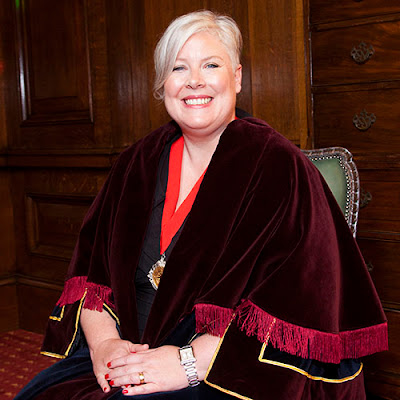The One that (nearly) got away... a final Advent Series blog
 |
| Serendipity, the word, was coined by Horace Walpole in 1754. He had been reading a Persian fable about the Three Princes of Serendip (originally published in 1557). The princes kept making fortuitous discoveries. and decisions. Serendipity can occur when producing a blog series, it is also common in scientific discovery - Alexander Fleming found the beneficial use for penicillin by chance. |
Being blissfully British, when Janet Webb said she wanted to submit an Advent Blog I told her I was delighted. When nothing turned up in my inbox, I presumed that she had had second thoughts and so I did not chase her. In turn, Janet did not contact me after hitting the send button to ensure that I had received it. I felt awful when I received a polite message from her on the last day of the series, which I had clearly labelled as such, asking me for feedback on her blog, so that she could understand why it was not included in the series.
Let me state that, although I have declined some posts over the years, I have always explained to the author the reasons why. I never simply ignore a submission. I would certainly not have ignored Janet's post - it's a great read with a good message. I am posting it now, the first Saturday after the Series ,and I hope you enjoy it as much as I have.
Janet is on a mission at work - to help every individual find their best way of being. She is a freelance organisational design specialist, having held senior HR, training and OD roles in a leading retailer, within healthcare and the public sector. She lives in a seaside resort in West Sussex, in a town with a delightful harbour and beaches - a beautiful part of southern England. Janet is a blogger - she writes about a range of business/work/people related subjects on her blog, Damp Ink, she also has a faith blog - Praying Out Loud - the thoughts of an unfit disciple. Janet is values driven and comfortable speaking her mind. She wants to make the world a better place. She is active on social Media - I know her through Twitter (her handle is @JWebbConsulting).
***************************************
Have a Heart
Heights
A few years ago my husband, children and I packed up our
gear and went off for an adventure; Four Webbs Go Mad in Dorset. Our plan was
to camp at Langton Matravers and go rock climbing at Dancing Ledge, a wave cut
platform on the Jurassic Coast, near the fabulously named Scratch Arse Ware.
 |
| Dancing Ledge - photo Janet Webb |
The children had been learning to climb with the Sea Cadets
(a youth organisation that gives young people opportunities for extraordinary
experiences) and Jonathan and I had climbed together when we were first married,
some “cough” years previously. This was the first time we had climbed together
as a family; and what larks we had!
We were top rope climbing; a rope is fixed to the climber,
passed through an anchor at the top of the cliff and then held onto by someone,
the belayer, at the bottom of the cliff. Their job is to keep the rope tight so
that if the climber falls they don’t fall very far. My kids belayed for each
other and at one point, strapped together, they belayed for their father; what
a fabulous lesson in trust. We had fun, managed danger, explored interdependence
and encouraged, supported and challenged each other. It was a magical time in
beautiful surroundings. Together we stepped out of our comfort zones. We
literally and metaphorically climbed heights and as a result gained confidence
in ourselves and each other.
 |
| Jonathan Webb being belayed by his children - photo Janet Webb |
This kind of bonding, growing and learning is something that
a good working life gives us; social interaction, the chance to try new things,
learning from our mistakes, feeling supported and challenged.
Hollows
In contrast, I am currently working with groups of people
who have been out of work for a long time – over 10 years in a few cases. For
some their comfort zones are miserably small and may not even include their own
home space. They have stopped growing and learning because they have stopped
having opportunities to do so. The lack of the stimulation that employees take
for granted, leads to limiting habits and a shrinking of perspective, hope and
joy. Life is a treadmill of applying for jobs that they have little hope of
getting, trying to prove to the Job Centre that they are attempting to push a
load up a mountain and eking out their funds to cover the basics of life;
basics that usually don’t include Christmas parties, hobbies, being able to buy
a round of drinks for friends, owning a pet, running a car. Always at the mercy
of bus timetables, agencies who don’t quite bother enough and potential
employers who don’t quite care enough, the struggle and isolation is
dispiriting.
 |
| Long-term unemployed 15-74 year olds across Europe, July 2016 |
Take Aaron. He was running his own successful catering
business, started from scratch, when he gave it all up to be a full time carer
for his mother. When she died some years later he lost his home, his mother,
his daily routine and his purpose. After a crippling few years of grief and
isolation, he was facing the rest of his life with dread; no qualifications, no
recent, relevant experience and serious doubts about his own value.
Betty. After her husband died she didn’t leave the house for
ten years. By the time she sought help, her self esteem and confidence in her
own ability was through the floor.
 |
| Crying Woman, Picasso, 1937 |
Charlie. He worked for the same employer from school, as a
skilled worker, for 40 years. Now that modern life has done away with that
industry, he is struggling to learn IT skills just to be able to apply for
minimum wage jobs that he has no hope of getting.
Debbie. A difficult childhood and time in care homes has
given her rocky foundations to build her adult life on. Walking into a room
with strangers is a challenge.
These are not scroungers and wasters; these are people who
have been dealt a poor hand and are expected to pull themselves out of the hole
that they are in. Yet they don’t have the resources to do that. And those
resources are not going to develop through a life of visiting the job centre,
walking around town to relieve the boredom and sitting in a library, applying
for jobs that they know literally hundreds of other people are also applying
for.
Heart
The good news is that things can get better. Betty
volunteered for two years in a charity shop and on the back of that she got a
job last week. Debbie was given a work taster in a supermarket and is now
working there full time, blossoming and loving it. Aaron was given some basic
IT help and some interview skills practice and now feels able to take on the
world.
What can make the difference is someone taking an interest;
having a heart for them. Eric got an e-mail last week from an employer who had
received his CV. A response - almost unheard of! He brought the e-mail to show
us. It was written with thought and compassion and although it didn’t offer a
job it was personal, wishing Eric a happy Christmas and New Year. Eric was
chuffed to bits; someone had taken the time and had treated him like a person. Frank
was phoned up by an interviewer to say that he hadn’t got the job and why. She
also gave some feedback, unsolicited. Again, almost unheard of! Frank was
amazed and the feedback was genuinely helpful.
Most of the time, they don’t hear anything and they get no
feedback, even when they ask. Occasionally they get treated really badly. Jobs get
offered then snatched away. Jobs are filled internally but the employer has
gone through a pretence of recruitment to demonstrate fairness. Georgie had to
save up the bus fare to get to a job interview only to discover that the
employer wanted a skilled chef, whereas the agency had sent her for a kitchen
porter job. When your self esteem is at rock bottom, to be treated so badly can
just confirm in you that you lack value.
What’s needed is for employers, HR teams and recruitment
agencies to have a change of heart:
- to
not treat low skilled workers as low skilled people
- to
not just farm out the low wage jobs to agencies
- to care
and be accountable for how applicants are treated by agencies
- to
refund precious bus fares
- to
offer and give good feedback
- to
challenge the need for recent relevant experience
- to
not reject someone because they haven’t worked for two years
- to
take care about job adverts
- to
read past the first paragraph on a CV
- to
give people a chance.
If you can give someone a work taster for two months, two
weeks, two days even, you could be the turning point for someone and the route
off the treadmill. Do it for Corporate Social Responsibility reasons. Do it
because you just might find a gem. Do it because you have a heart. Do it.
Note: names and circumstances have been changed to protect
identities. However, all these stories are real.


















